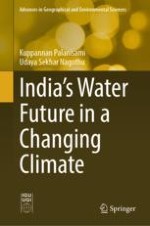2024 | OriginalPaper | Buchkapitel
6. Maximizing Wastewater Reuse
verfasst von : Kuppannan Palanisami, Udaya Sekhar Nagothu
Erschienen in: India's Water Future in a Changing Climate
Verlag: Springer Nature Singapore
Aktivieren Sie unsere intelligente Suche, um passende Fachinhalte oder Patente zu finden.
Wählen Sie Textabschnitte aus um mit Künstlicher Intelligenz passenden Patente zu finden. powered by
Markieren Sie Textabschnitte, um KI-gestützt weitere passende Inhalte zu finden. powered by
